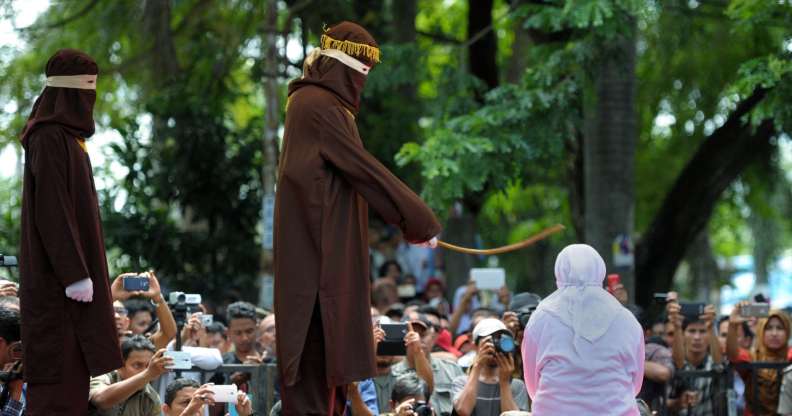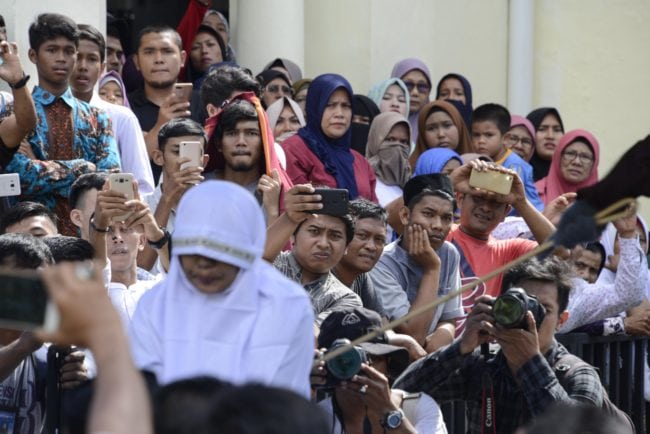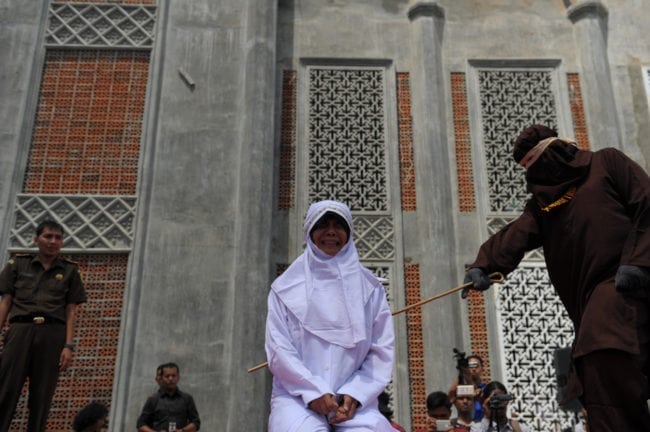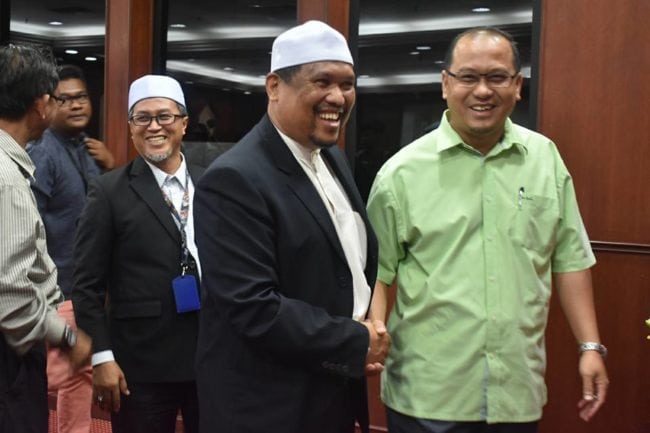Malaysia’s prime minister says women shouldn’t have been caned for having gay sex

File photo. The women in Terengganu were caned six times each (CHAIDEER MAHYUDDIN/AFP/Getty)
Malaysia’s prime minister has condemned the caning of two women for having sex in the country, saying the punishment “does not reflect the ideals of justice and compassion of Islam.”
The two women. aged 32 and 22, were caned on Monday (September 3) in front of a crowd of about 100 people.
The pair were sentenced in August, after Sharia enforcement officials in the northeastern state of Terengganu found them having sex in a car.

A woman is whipped for a Sharia law violation in Indonesia (CHAIDEER MAHYUDDIN/AFP/Getty)
In a video posted on Twitter, the country’s leader Mahathir Mohamad criticised the punishment, adding that the caning should not have taken place because the women were first time offenders.
“The cabinet discussed the case of the two women and is of the view that [the caning] does not reflect the ideals of justice and compassion of Islam,” the 93-year old prime minister said, according to a translation by Channel NewsAsia.
“As this was the first case for them, they should’ve been given advice and not punished.
“The cabinet is of the opinion that the circumstances of each case should be considered and how we can, under Islam, hand out punishments that are lighter while at the same time give advice and counsel to the parties.”
He added: “We need to show that Islam is not a ruthless religion that shames people with harsh punishments.”
The caning of the women was delayed last week because of “technical reasons,” but was carried out on Monday in front of a crowd of around 100.
The women were also fined RM3,300 (£630) each, with a four-month prison term if they fail to pay.

A woman is caned in Aceh, Indonesia, where Sharia law is in effect (CHAIDEER MAHYUDDIN/AFP/Getty)
Gay sex is banned in the country, which groups it together with bestiality in a list of offences which are “against the order of nature.”
Rachel Chhoa-Howard, Amnesty International’s Malaysia Researcher, told PinkNews that the “appalling” canings seemed to be unprecedented.
“To our knowledge, this is the first time this punishment has been imposed in the country for same-sex relations in this way, for this so-called crime.
“We believe that a lot of the time punishments are meted out in private,” said Chhoa-Howard.
The fact that this was carried out in a courtroom, in front of activists, officials, family members and dozens of onlookers, was, she said, “a sign Malaysia is becoming a more hostile place.”
“We’re incredibly disappointed and view it as a major setback. There’s a growing atmosphere of persecution, and Malaysians are scared,” said Chhoa-Howard.
“The sense is that they feel increasingly at risk, and rightly so.
“In recent years, this level of hostility that LGBT+ people are facing, is unprecedented.”

State executive council member Satiful Bahri Mamat (second from right) (Uztaz Saiful Bahri Mamat/facebook)
Save Malaysian LGBT Community, an activist group in the country, told PinkNews that queer people were “receiving threats from the local community.”
Justice for Sisters (JFS) and Sisters in Islam, two other Malaysian pro-LGBT+ groups, said in a joint statement that the lashings constituted “a travesty and a grave miscarriage of justice.”
JFS had already called the punishment “a gross violation” of the women’s “dignity and human rights,” which, the group added, “amounts to torture.”
Malaysia is currently embroiled in a political furore over LGBT+ rights, sparked by government minister Mujahid Yusof Rawa’s order to an arts festival to remove its portraits of local queer activists last month.
After this inflammatory decision, Malaysian police raided a gay bar in the country’s capital of Kuala Lumpur.

